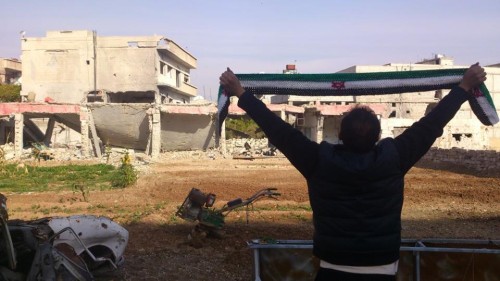PHOTO: Qusai Zakarya in Moadamiya
Last month Qusai Zakarya, a prominent activist in the besieged Damascus suburb of Moadamiya, left Syria after death threats.
See Activist Zakarya Leaves Country After Detention “I Won’t Give Up for a Million Years”
Zakarya had waged a months-long campaign against the attacks and blockade of the Syrian military, highlighting the hunger and suffering of civilians. In November, he started a 33-day hunger strike, recording developments and the situation in Moadamiya in his daily on-line diary.
See Moadamiya – “If You Back the Revolution You Will Starve To Death”
A Hunger Striker’s Cry “What Have They Done to My Country?”
In January, after a local cease-fire agreement, Zakarya was taken to Damascus for three weeks of interrogation. He finally was allowed to leave for Beirut.
The activist is now in Washington, from where he wrote these reflections on Thursday:
There are echoes and shadows of previous days and old friends. It’s strange how life can become like daydreaming. No more black and white for me, I guess. Everything is colored in gray: my past, present and future.
It took almost three awkward weeks in Damascus, staying at the Dama Rose Hotel, meeting high profile officers from the Forth Division, acting and lying to them until I managed to make it to Beirut using a fake ID.
In Beirut, things became even more awkward for me as I met friends and reporters who I had spoken and worked with for months without ever meeting in person. It’s funny how these types of relationships develop, how we put names, faces and flesh to voices on the phone and Skype.
I got myself a new phone number in Lebanon using my fake ID and within hours it was under watch by God knows who. Sometimes while talking to friends, the line would open and I’d heard people talking in Russian. Sometimes, I’d randomly hear the answering machine of a Syriatel number, as if I called someone and their phone was turned off. The best part of Beirut was meeting a lot of amazing and pure hearted people and getting to know them better.
While in Beirut, I also broke up with my girlfriend who I hadn’t seen in years. It seems like sometime between the last time I saw her and the time I called her from Beirut, she had moved on with her life. She is not the girl I used to know. It also hurt that I was so close to my mom and family members but couldn’t see them.
Meanwhile, back home, friends and people I thought I could trust started saying bad things about me because I left or because I talked about the corruption that was happening in Syria.
The regime too was pissed at me and created a huge campaign against me and my family, accusing me to be a CIA agent or God knows what else because I am asking people in the US and the world to care more about Syria and push their governments to help.
While leaving from Beirut, I went through a lot of trouble until I made it to DC. I felt like Ben Affleck in Argo, but the minute the plane took off from Lebanon, there was no more fear of being caught…I think.
Now here I am on the other side of the planet, away from my beloved Syria and Moadamiya, surrounded by so many amazing Syrians, crowded streets, tall buildings, and a loneliness growing like a beast, eating me from the inside.
Whenever I hear the sound of an airplane, my eyes turn to the sky in search of a MiG fighter or a chopper dumping explosive barrels. I always keep my cellphone on the charger in preparation for blackout. I store extra packs of cigarettes and candy bars so in case anything happens, I won’t be starving or dying for a smoke like I used to.
People here don’t know how much they are blessed to have power and food and safety and they take it for granted. They don’t hug their family and friends tight like we do because they don’t feel that this might be the last time they might see them. They don’t understand… they just don’t. But this is going to change. I will speak, scream, and write, until they start listening… until they understand.
In DC, I met a couple of friends I consider close, but I did my best to hide from them, because they know how much I suffer and I didn’t want to fall apart and cry like a five years old. That would only make both of us feel bad. But now I feel even worse because I realize that my avoidance made them feel like I don’t care about them, while all I was trying to do was stay strong enough to do the work I’m supposed to do here.
Somehow, I have to find a way to stop feeling lost and lonely in Washington.

